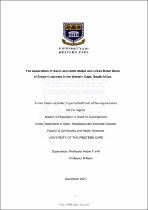| dc.contributor.advisor | Travill, Andre | |
| dc.contributor.author | Adonis, Emilia | |
| dc.date.accessioned | 2024-04-11T14:07:39Z | |
| dc.date.available | 2024-04-11T14:07:39Z | |
| dc.date.issued | 2023 | |
| dc.identifier.uri | http://hdl.handle.net/11394/10743 | |
| dc.description | Magister Artium (Sport, Recreation and Exercise Science) - MA(SRES) | en_US |
| dc.description.abstract | Early childhood is a critical period for the advancement and mastery of gross motor skills. Gross motor skills consist of locomotor and object control skills. The development of these two groups of skills for primary school children is important as they form the basis for the development of skills that will allow children to participate in games and sport later in life. There are various factors which impede the development of gross motor skills. Numerous researchers highlighted the negative impact of low socio-economic status and poverty on growth and motor skill development of young school going. Existing research results reported in the literature, show inconsistent and sometimes conflicting outcomes regarding the relationship between socio-economic status and gross motor skills with some reporting strong positive relationships while others found no significant associations between these variables. | en_US |
| dc.language.iso | en | en_US |
| dc.publisher | University of the Western Cape | en_US |
| dc.subject | Socio-economic status | en_US |
| dc.subject | Gross motor skills | en_US |
| dc.subject | Physical development | en_US |
| dc.subject | Physical activity | en_US |
| dc.subject | Fine motor skills | en_US |
| dc.title | The association of socio-economic status and gross motor skills of grade-4 learners in the Western Cape, South Africa. | en_US |
| dc.rights.holder | University of the Western Cape | en_US |

